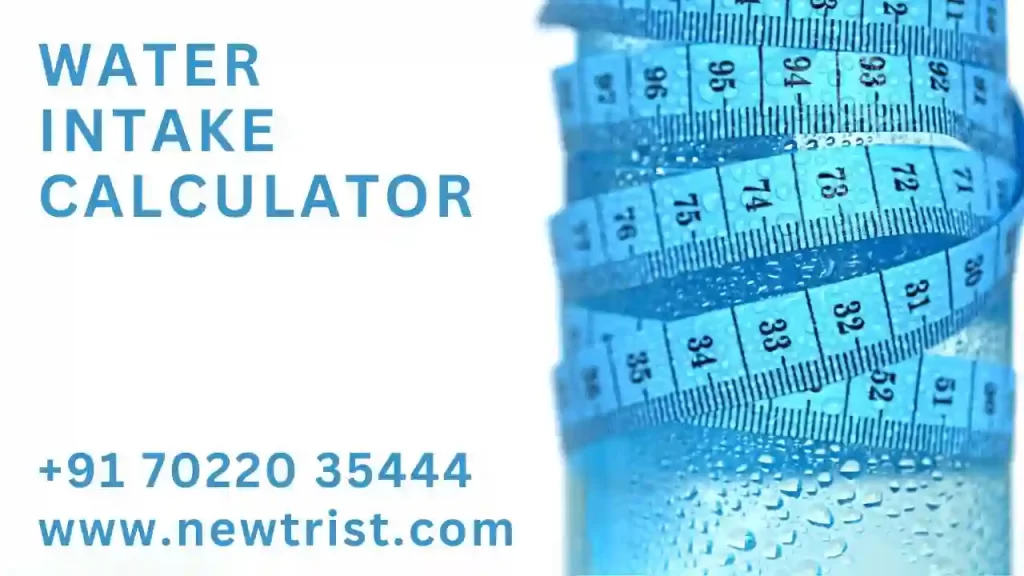Water Intake Calculator finds the amount of water a person should drink for daily activities. Water helps to prevent dehydration and cleanses the body.
Water Intake Calculator
| require | require |
you should drink ...... of water per day
Daily Water Intake Calculator
The daily water intake calculator finds the water required for your body based on weight, height, activity, age, and climate to plan your water consumption.
Consult 19 years experienced Chief Nutritionist Vasanthi for expert advice and a personalized diet plan. In-person consultation at HSR, Koramangala, Bellandur, Haralur, and video consultation across India.
The water intake calculator focuses on various factors like age, gender, height, weight, season, and activity levels. Do not wait until you feel thirsty to drink water.
- The water intake increases if you are leading a very active lifestyle.
- Manage your weight by drinking a glass of water before a meal to control the hunger pangs.
- Fat metabolism may be ineffective if the body faces a scarcity of water.
- If you need to know how much water you should drink in a day, the water intake calculator helps to calculate the water levels.
- Book a consultation with our nutritionist before making changes in your water intake based on your health problems.

How much water should you drink a day?
- The recommended daily water intake for men is usually 3-4 liters/day and for women, it is 2-3 liters/day. These measurements may differ based on the body conditions.
- Drinking 8 glasses of water may increase/decrease based on the lifestyle you are in to stay healthy.
- Water requirements increase for pregnant and lactating women.
- Water is not the only way to meet the fluid requirements, the fruits and vegetables that you add to the menu also add to the water content.
- Some people who drink too much water beyond their requirements are considered a rare problem in healthy adults.
Water intake chart by age
| Age | Water intake |
| <1 year | 700 -800 ml |
| 1-3 years | 1.3 – 1-4 lt |
| 4 – 8 years | 1.7 – 1.8 lt |
| 9 – 13 years (Boys) | 2.4 lt |
| 9 – 13 years (Girls) | 2.1 lt |
| 14 – 18 years (Boys) | 3.3 lt |
| 14 – 18 years (Girls) | 2.3lt |
| >18 years (Men) | 3.7 lt |
| >18 years (Women) | 2.7 lt |
| Pregnant Women | 3 lt |
| Lactating women | 3.8 lt |
Benefits of drinking water
- Drinking water helps in weight loss. One can experience reduced appetite if he consumes water before eating food.
- Helps in relieving constipation. Increased fluid consumption helps to tackle constipation problems and regulate bowel movements.
- Headaches and migraines caused due to dehydration can be relieved by consuming plenty of water. A study reveals that drinking 1.5 liters of water showed improvements in migraine symptoms.
- A high intake of water can flush out kidney stones that are small in size by increasing the urine volume. It also prevents the recurrence of stones by diluting the minerals, thereby reducing the chances of forming clumps and crystals.
- Drinking water before you start to work out increases performance and reduces fatigue. Dehydration causes difficulty in physical activities even when 2% of the body’s water content is lost.

WHO water drinking standards
WHO has set standards for drinking water. The quality of drinking water determines a person’s health. The safety of drinking water helps prevent water-borne diseases.
| Parameters | Standard Limits as per WHO (mg/L) |
| Arsenic | 0.01 |
| Ammonia | 1.5 |
| Benzene | 0.01 |
| Chlorine | 5 |
| Chloroform | 0.3 |
| Color in drinking water | Nil |
| Dissolved oxygen | Not recommended |
| Fluoride | 1.5 |
| Iron | Not recommended |
| Lead | 0.01 |
| Mercury | 0.006 |
| Nitrate | 50 |
| Nitrite | 3 |
| Selenium | 0.01 |
| Trichloroacetate | 0.2 |
| Uranium | 0.015 |
| Zinc | Not recommended |
Water consumption calculation formula
- Our water intake calculator provides you with the total amount of water you should consume in a day. It is calculated based on weight, height, age, and other factors into consideration.
- Fluid consumption may be in the form of water, juices, soups, tea, infused waters, and smoothies. Include lots of fruits and vegetables that are high in water content for increased intake.
- Too much water consumption can lead to hyponatremia, where sodium levels drop below normal levels, which can cause severe complications.
- Start your day by drinking water. some people forget to drink water due to their work problems and stress. Make it a habit to drink water regularly for better hydration and energy levels.
- Carry your water bottle wherever you go to ensure proper hydration and water safety. Drink water for better health and wellness.
FAQs
Will Drinking Water Reduce Protein in Urine?
Drinking water doesn’t help in proteinuria. Drinking more water helps you urinate more frequently, indicating less protein in the urine, but the leakage of protein from the kidneys cannot be controlled.
Can water intake induce weight loss?
Yes, water intake reduces hunger, increases metabolism, and makes workouts easier and more comfortable.
Can drinking water lower blood pressure?
Consuming 8-10 glasses of water has been found to manage blood pressure to some extent. Mineral water that contains calcium and magnesium in water can enhance its impact in lowering blood pressure.
Why water intake is restricted for heart patients?
It is difficult for the heart to pump more blood if the fluid content is high in the bloodstream of the heart patients. Hence, it is advised to limit the water intake for heart patients.
Is it good to drink water while working out?
Drinking water during a workout is essential to balance the fluid loss when you sweat. Drinking water helps to normalize the increased body temperature and maintains performance levels.
How much water should a woman drink in a day?
A healthy woman should drink 2.7 liters of water per day. This quantity may differ based on lifestyle. Food constitutes 20% of the fluid intake and the rest is from drinks.
How much water a pregnant woman should drink?
Water requirements increase with pregnancy. It is necessary to drink 8-12 glasses (app. 3 liters) of water during pregnancy. Water helps in the formation of amniotic fluid that surrounds the fetus.
Water intake after delivery?
13-16 cups of water are advised to take after delivery to manage the water levels that are used for the formation of milk during nursing.
How much water should be consumed after a C-section delivery?
Water intake after C-section delivery is not restricted. But a woman can have the side effects of anesthesia after delivery and is expected to lie down post-c-section due to the discomforts. This may interfere with the intake of water.
What is the recommended water intake for a lactating mother?
Water intake during breastfeeding should be 3.8 liters (16 cups)of water per day to compensate for the water used for the formation of milk. Babies solely depend on their mother’s milk for food and hydration purposes.
How much water should I take for glowing skin?
The recommended water intake for glowing skin is 3.7 liters for men and 2.7 liters for women. Water helps to improve the skin’s hydration and cleanses the skin from the inside. Water decreases the chances of dry, itchy, and scaly skin.
How much water should a liver cirrhosis patient drink?
1.5 liters of water is allowed for a liver cirrhosis patient in the form of fluids and other herbal drinks that helps to detoxify the liver and for its normal functioning. Water helps the blood to pass through the liver easily and cleanses the liver.
How much water should a dengue patient drink?
The water intake for a dengue patient should be 50 ml/kg which is calculated by adding the body maintenance and dehydration levels.
What is the recommended daily water intake for kidney patients?
Water intake for kidney patients for men is 3 liters per day and for women is 2-2.2 liters per day. Water hydrates the kidneys and lowers serum creatinine levels. Water is restricted for those who are under dialysis treatment.
How much water is too much?
Drinking more water than the kidney’s capacity to eliminate can cause hyponatremia in some people. Water intake above 4 liters for men and above 3 liters for women causes depletion of the important electrolytes in the body and creates an imbalance in the electrolytes